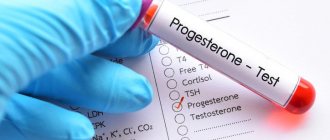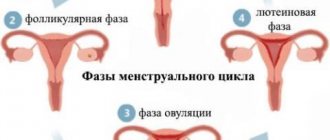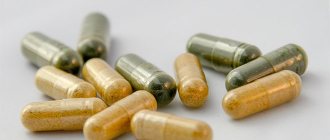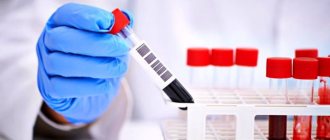The endocrine system is formed by many variants of hormonal substances. Each of them performs its specific function . Violation of the secretion of these substances does not go unnoticed for the woman’s body. Their deficiency or excess leads to gradual destabilization of all organs and systems. One of these hormones is prolactin.
Prolactin is a peptide hormone . Consists of 199 amino acids . Its production is carried out by the pituitary gland , namely the anterior lobe. And the production of prolactin is controlled by the hypothalamus.
Hormone functions:
- Promotes the production of progesterone by the corpus luteum.
- Provides attachment of the fertilized egg to the uterine mucosa.
- Affects the development of mammary glands.
- Responsible for the production of breast milk.
- Stimulates the proliferation of glandular tissue of the mammary glands in the 3rd trimester of pregnancy.
- Inhibits ovulation and inhibits the onset of subsequent pregnancies during lactation.
- May act as an anesthetic.
- Regulates sexual behavior.
- Participates in the formation of the vascular, central and peripheral nervous systems.
- Activates immunity in both fetuses and adults.
- Responsible for normal kidney function and water-salt metabolism.
- Stress hormone. Adapts the body to stressful situations.
- Stimulates the newborn's first breath: promotes surfactant production.
Reduced prolactin or hypoprolactinemia is a decrease in its production by the anterior pituitary gland and, as a result, its concentration in the blood reaches values below standard values.
A decrease in the hormone is considered a rather rare condition; it can occur secretly, without showing any symptoms. Occurs in approximately 11% of women . This condition can be physiological and pathological.
Symptoms
The decrease in prolactin is confirmed by the results of laboratory tests. When making a diagnosis, doctors also necessarily take into account the overall clinical picture.
- If prolactin is reduced in a man, then libido decreases and the ability to conceive becomes more difficult.
- A decrease in prolactin in women is accompanied by difficulties with conception, menstrual irregularities, miscarriages, lack of breast milk after the birth of a child, edema, and metabolic disorders.
Reduced prolactin is accompanied by enlarged mammary glands, menstrual irregularities, irritability, unreasonable fears, and increased hair growth in the face and body.
The clinical picture is often supplemented by:
- headaches
- dizzy
- psycho-emotional disorders
- difficulties conceiving a child
- early or late miscarriages
- decreased quantity or complete absence of milk during breastfeeding
- swelling
The described symptoms can also be supplemented by a decrease in libido, increased body weight, and discharge from the mammary glands. It is necessary to immediately seek advice from a gynecologist if your health worsens and is accompanied by fluctuations in body weight, menstrual irregularities, engorgement of the mammary glands, deterioration of vision or memory, irritability, tearfulness.
Choose a specialist and make an appointment with an endocrinologist online
The importance of prolactin for women and men
For the male body, the importance of prolactin lies in its effect on the secretion of testosterone, which is responsible for protein metabolism in muscle tissue, the formation of genital organs, sexual desire and sperm capable of fertilization. If a man notices a decrease in erection, then he begins to think about the development of impotence and buys special pills to increase it. In this case, a common cause of such a failure is a hormonal imbalance associated with a reduced level of prolactin.
The main functions of the hormone for women are to ensure the possibility of conception and to activate the production of breast milk in women in labor. Prolactin affects the ovulation process, so deviation in any direction from the norm prevents the development of the follicle, does not allow the fertilized egg to attach to the inner walls of the uterus, and, therefore, threatens infertility. In the third trimester of pregnancy, it promotes the formation of glandular tissue of the mammary glands. After childbirth, under its influence, colostrum is converted into breast milk, ovulation is inhibited, which prevents conception during lactation. Scientists have also long noted the relationship between prolactin and estradiol, so they talk about the influence of the former on the formation of the reproductive system of the female body.
The general effect of the hormone on the female and male body is as follows:
- regulation of the functioning of the immune system;
- participation in water-salt balance;
- ensuring the growth of a person’s adaptive capabilities under stress;
- formation of secondary sexual characteristics, sexual behavior;
- decreased pain threshold;
- participates in the process of blood clotting.
Another important function of prolactin is to provide the baby with his first breath by activating the production of the substance his lungs need.
Causes
Prolactin can decrease under the influence of such predisposing factors:
- Sheehan's syndrome (pituitary apoplexy), which occurs among patients with insufficient pituitary gland function
- Post-term pregnancy
- Use of certain groups of drugs
- Previous brain injuries
- Tumor formations in the brain
- Exposure to Radiation
- Eating disorders, unhealthy lifestyle
- Extensive blood loss after surgery
- Difficult labor
- Presence of hemorrhages in the brain
To find out the root cause of the disorder, you need to consult a doctor and undergo a comprehensive examination.
Post-term pregnancy
Post-term pregnancy is accompanied by a decrease in the concentration of estrogen and, consequently, prolactin in the blood plasma. The term “post-term pregnancy” refers to a condition when the duration of gestation increases to 42 weeks or longer. This condition is accompanied by dehydration. The amount of amniotic fluid decreases, the body weight of a pregnant woman decreases, and symptoms of aging of the placenta appear. The skull bones of the fetus become denser, and hypoxia may develop.
This condition can occur under the influence of:
- infectious diseases
- endocrine disorders
- dysfunction of the gastrointestinal tract and liver
- hormonal imbalance
- inflammatory processes of the reproductive system: cervicitis, adnexitis, endometritis
- tumor processes: fibroids, fibroids
- ovarian dysfunction
- preeclampsia
- previous induced abortion
To confirm the diagnosis, ultrasound, cardiotocography, and amnioscopy are performed.
Extensive blood loss
Extensive blood loss is a pathological process that occurs as a result of severe bleeding. Leads to hypoxia, a change in circulating blood volume, a decrease in prolactin and other vital hormones. If blood loss is slow, then the clinical picture may be blurry. With the rapid loss of a large volume of blood, the body's compensatory mechanisms may not have time to turn on.
Hemodynamics will worsen, this condition is accompanied by a decrease in oxygen transport, oxygen starvation, and a weakening of the contractile function of the myocardium. With overwork, hypothermia, overheating, sensitivity to blood loss increases. Moreover, women show greater resistance to this condition compared to men.
Sheehan syndrome
Sheehan syndrome is a functional deficiency of the adenohypophysis, which is a complication of labor. Accompanied by severe bleeding and arterial hypotension. As a result of hypovolemia during childbirth, the pituitary gland enlarges and blood flow in it decreases. Pituitary cells die, milk secretion decreases, amenorrhea and oligomenorrhea develop.
Hair and nails become brittle, there are complaints of swelling, dizziness, fainting, weakness, increased fatigue, and skin hyperpigmentation. To confirm the diagnosis, the pituitary gland, thyroid gland, ovaries, and adrenal glands are examined. X-rays, computed tomography, and magnetic resonance imaging are also indicated. The treatment regimen includes hormonal medications, symptomatic antianemic drugs, and anabolic agents.
Use of medications
Oral intake of certain groups of medications can also cause a decrease in prolactin levels.
These include:
- anticonvulsants
- apomorphine
- calcitonin
- cyclosporine A
- bombesin
- secretin
- dopaminergic agents based on dopamine, levodopa, bromocriptine, cabergoline, terguride, ropinirole
- nifedipine
- tamoxifen
- conjugated estrogens
- rifampicin
- dexamethasone
- morphine
If there are objective indications for taking the described groups of medications, it is necessary to discuss with your doctor their dosage and possible methods of drug correction of emerging complications. If there is a significant deterioration in health, the treatment regimen is reviewed and alternative treatment options are selected.
Brain injuries
Traumatic brain injuries are a physical disorder that results in organ dysfunction. The diagnosis is made on the basis of emerging complaints, as well as the results of instrumental diagnostics. Traumatic injuries affect hormonal levels and can lead to a decrease in prolactin concentrations.
The most common causes of hormonal disorders are:
- skull fractures
- hematomas
- bruises
- diffuse axonal injuries
- concussions
In the first 24-48 hours after injury, it is recommended to restore adequate organ perfusion and ensure sufficient oxygen supply to the brain. Efforts are directed towards preventing the development of complications and changes in consciousness. Most patients require subsequent rehabilitation.
Tumor formations in the brain
Brain tumors can lead to changes in prolactin concentrations. Such a disorder can be accompanied by intense headaches and thyroid dysfunction if tumor formation leads to the destruction of hormone-producing tissue. Tumors are classified into secreting and non-secreting.
Growing tumors can lead to visual impairment, atrophy of the optic nerves, and increased intracranial pressure. Diabetes insipidus, amenorrhea, gynecomastia, erectile dysfunction, and Cushing's syndrome are also possible. If the tumor compresses the entire anterior lobe of the pituitary gland, apoplexy occurs, causing severe headache and, in severe cases, a significant decrease in visual acuity.
Radiation exposure
Radiation exposure can provoke changes in hormonal levels and a decrease in prolactin concentration. People who are regularly exposed to radiation are susceptible to the following radiation effects:
- somatic: radiation sickness, local radiation injuries, leukemia, tumor formations
- genetic: gene mutations, chromosomal aberrations
If exposure to this type of radiation is necessary, doctors always take into account the balance of potential risk and expected benefit for the patient.
Lifestyle
Lifestyle can also affect prolactin levels. A decrease in concentration can be observed under the influence of:
- errors in the diet: insufficient consumption of healthy fats, proteins, fiber, which removes bad estrogen metabolites from the body
- bad habits: drinking alcohol, smoking
- insufficient physical activity, which leads to disturbances in lymph flow, congestion, and excess weight gain
- non-compliance with work and rest schedules
- insufficient sleep: the body does not receive enough melatonin, becomes more susceptible to inflammatory processes and hormonal changes
- non-compliance with the drinking regime, which leads to dehydration
- constant exposure to stress and psycho-emotional disorders
Lifestyle correction is only one of the stages of a comprehensive impact on the problem. It is important to direct efforts to eliminate all exogenous and endogenous factors in order to bring prolactin levels back to normal.
Hemorrhages in the brain
Hemorrhages in the brain are severe pathological conditions that arise as a result of a violation of the integrity of blood vessels. The mortality rate exceeds over 35%. May lead to changes in hormonal levels, in particular to a significant decrease in prolactin levels. Intracerebral hemorrhage is characterized by an acute onset and rapid progression. Accompanied by intense headache, dizziness, nausea, vomiting.
Possible disturbances of consciousness, up to deep coma. Patients with such disorders should be hospitalized immediately. During therapy, conservative and radical treatment methods are used, including surgical intervention. Self-medication of cerebral hemorrhages is unacceptable and is fraught with serious irreversible complications.
How to increase prolactin
If symptoms of hypoprolactinemia appear, you should contact an endocrinologist who is involved in normalizing hormonal levels. Often, consultation with other specialists may be required. After clarifying the root cause of the pathology, the doctor chooses a treatment method. To increase prolactin, drug therapy, diet or a healthy lifestyle may be prescribed. To increase the effectiveness of the chosen method, folk remedies are sometimes recommended.
Treatment of pathologies that cause a decrease in prolactin
If the cause of hypoprolactinemia is associated with the above diseases, then the main therapy should be aimed at eliminating them. If the concentration of prolactin in the blood is reduced in women who want to become mothers or have recently given birth, then hormone replacement therapy is carried out with drugs that are obtained from the pituitary gland of animals. In case of Sheehan syndrome, they try to compensate for blood loss and additionally prescribe a course of gonadotropins and sex hormones. The presence of a pituitary tumor requires surgery to remove it. In case of post-term pregnancy, urgent delivery is carried out by cesarean section or stimulation of labor.
If it is impossible to influence the root cause of hypoprolactinemia, then symptomatic therapy is prescribed with the following means:
- diuretics – elimination of edema;
- antidepressants – normalization of the psycho-emotional state;
- painkillers or antispasmodics;
- drugs that lower blood pressure.
When choosing a treatment regimen, be sure to take into account the patient’s age, individual characteristics of the body, and the presence of concomitant pathologies. If the results of a blood test show a slight decrease in prolactin in the blood, then you can use the following folk recipes:
- Sage. To prepare a decoction, pour 50 g of leaves into 1 liter of boiling water and leave for 1 hour. Take the product 3 times. per day 100 ml.
- Raspberries. Leaves and inflorescences are collected in the spring and dried. The decoction is prepared by infusing for 1 hour 2 tbsp. l. raw materials, filled with 0.2 liters of boiling water. Drink the product ½ cup 4 rubles. per day.
- Fennel. The infusion is prepared from 1 tbsp. l. seeds Raw materials: 200 ml of boiling water, and after cooling, take in between meals. You need to drink 400–600 ml of infusion per day.
- Caraway. 2 tsp. seeds of the plant, pour 0.2 liters of boiling water and leave until cool. The resulting volume of infusion is drunk in small portions per day.
This treatment will increase the concentration of the hormone in the blood. The drugs can be supplemented with drug therapy, which will significantly increase its effectiveness. In this case, the use of traditional medicine must occur strictly with the permission and under the supervision of a physician.
Healthy lifestyle
The reason for the decrease in the hormone can be the influence of various external factors, therefore, to stabilize its level, doctors recommend following the following principles of a healthy lifestyle:
- Quitting smoking and drinking alcohol. Alcohol and nicotine significantly weaken male potency and increase the risk of infertility. Bad habits negatively affect the course of pregnancy and the health of the fetus.
- Balanced diet. A person’s diet should contain foods that provide a sufficient supply of vitamins and minerals to the body. This reduces the risk of developing infectious pathologies.
- Weight control. Sufficient physical activity, exclusion of fast food from the diet, minimal consumption of sweets prevents the development of obesity and hormonal disorders.
- Maintaining a rest and sleep schedule. Constant fatigue negatively affects a person’s psycho-emotional state and contributes to the development of depression.
With a slight decrease in prolactin, compliance with the above rules will quickly normalize hormonal levels, eliminate the need to take medications, and reduce the risk of developing serious complications.
Diet for low prolactin
An integral part of any therapy is nutritional therapy, because the foods consumed can increase or decrease its effectiveness. For obese patients, dietary modification is considered the first method of preventing or eliminating the problem. The list of dangerous foods includes canned food, smoked meats, white bread, boiled sausages, sweets, as well as spicy, fatty and salty foods.
If it is necessary to increase prolactin levels, it is recommended to enrich the diet with foods with healthy fatty acids, vitamins B9 and B12:
- beef;
- poultry meat;
- sea fish;
- offal;
- eggs;
- nuts;
- spinach and parsley;
- carrots, broccoli, cauliflower;
- legumes;
- sprouted wheat, oats;
- grapes, apples, pomegranate;
- rice and barley porridge.
For cooking, it is recommended to use soybean, linseed, and sesame oil. Folic acid enhances the production of sex hormones, and B12 increases its effectiveness, so it is better to use them together.
Possible complications
Possible complications depend on the underlying cause, which provokes a decrease in prolactin levels. Patients with Sheehan syndrome are at increased risk of developing treatment-resistant anemia. The following complications are also possible:
- respiratory depression
- cardiovascular disorders, dysfunction of nervous system organs
- hypothyroid coma
- adrenal insufficiency
- involution of the mammary glands
- early menopause
- persistent infertility.
In order to prevent the development of serious, life-threatening conditions, at the first symptoms of a disorder, it is recommended to seek qualified medical help. Complications of post-term pregnancy include: hypoxia, asphyxia, brain damage, birth injuries, aspiration of meconium/amniotic fluid. Children are more susceptible to the development of jaundice, hormonal crises, infectious skin lesions, and neurological disorders. Brain injuries can be complicated by amnesia, behavioral changes, emotional lability, sleep disturbances, and decreased mental function.
Traditional medicine recipes
Methods of alternative (traditional) medicine can only be used after excluding tumor and endocrinological pathologies that require mandatory drug or surgical correction.
Seaweed
Seaweed (fucus, kelp) is a well-known folk remedy for reducing prolactin, which is often used by women to stop lactation.
Kelp
To achieve a positive result, you need to take algae powder for at least 2-3 months, having previously examined the thyroid gland and the level of iodine in the body. Before use, algae powder must be mixed with a teaspoon of any vegetable oil.
Kelp powder
Take the mixture on an empty stomach in the evening, without combining it with meals. It is allowed to drink algae with a small amount of water, but not more than 50-70 ml per dose, since water load stimulates the secretion of prolactin.
Freshly squeezed cherry or raspberry juice
Cherry and raspberry juices are not recommended for women during breastfeeding, as they can suppress lactation. Take freshly squeezed juice (you can add fresh raspberry leaves to the resulting drink) 3 times a day on an empty stomach in between meals. The course of treatment is 2 months.
Cherry juice
Note! Fresh cherry juice also has a pronounced sugar-lowering effect, so it is useful for people with diabetes, obesity and various endocrine disorders.
Infusion of Potentilla erecta
Cinquefoil erecta, also known as galangal root, is one of the most powerful remedies for lowering prolactin without the use of drugs.
Cinquefoil erecta
An infusion of galangal root can also be used to quickly relieve vomiting, diarrhea, and eliminate cramping pain in the stomach and intestines due to infectious lesions of the gastrointestinal tract.
Kalgan root
To prepare the infusion, you need:
- chop a small amount of dried root (about 1-1.5 cm) and put it in a container;
- pour 300 ml of boiling water;
- cover with a lid and leave for at least 30 minutes.
The cinquefoil infusion should be taken 2 times a day, dividing the resulting volume into two doses. The course of treatment is 3-4 weeks. In total you need to take three courses with a break of 14 days.
Diagnostics
If there is a suspicion of a decrease in prolactin levels, the doctor will order a laboratory test of hormone levels. To check your prolactin level, you need to take a blood test from a vein. It is taken in the morning, immediately after waking up and being in a calm state. The best option to obtain the most accurate result would be to call a nurse from the laboratory to your home.
It is recommended to undergo the study several times: in different phases of the menstrual cycle. Particular attention is paid to indicators obtained on the 5th day of the menstrual cycle, as well as in the luteal phase of the menstrual cycle. 48 hours before the examination, abstain from sexual intercourse and significant physical activity, and try not to eat sweet foods.
Depending on the phase of the menstrual cycle, prolactin levels will vary:
- follicular: 4.5-33
- ovulatory: 6.2-48
- luteal: 4.8-40
If the concentration is impaired, the doctor recommends additional studies:
- ultrasound diagnostics of mammary glands
- magnetic resonance imaging of the brain
- study of quantitative calcium content in blood serum
To exclude or confirm a violation of the secretory function of the adenohypophysis, the following indicators are additionally examined:
- TSH
- follicle stimulating hormone
- luteinizing hormone
- estriol
- triiodothyronine
- thyroxine
- cortisol
- targeted radiography of the sella turcica to determine the size of the glands
- MRI, CT
Additionally, urine is examined for the presence of 17-ketosteroids, and glucose tolerance testing is performed after a sugar load. Taking into account accompanying complaints, the plan of diagnostic studies can be expanded. Depending on the results obtained, the specialist will select the appropriate treatment regimen.
Diet adjustments
If pathologies that provoke an increase in prolactin are identified and there is a single increase in the hormone in the blood, treatment must begin with a change in regimen. It is important to maintain a work-rest schedule, eat right, and include vitamins D, B, and C in your diet. You should not perform long-term sports activities.
Rules for adjusting nutrition:
- coffee and other tonic drinks are excluded;
- It is necessary to add foods containing folic acid (liver, parsley, spinach) and more fiber to the daily menu;
- Fatty foods, heavy red meat, chemical products, and preservatives are removed from the diet;
- the consumption of baked goods, pasta, smoked meats, and semi-finished meat products is excluded;
- a small amount of dietary meat is added;
- All dishes are steamed or grilled, without oil.
It is important to add foods to your dishes that stimulate intestinal motility , since many hormones are synthesized and absorbed into the blood through the walls of this organ. It is recommended to drink more fluids, consume large amounts of vegetable oils and nuts. It is necessary to reduce the amount of protein consumed.
A diet to lower prolactin should stimulate the growth of estrogen in the blood. During the treatment period, it is important to pay attention to the patient’s mental state, since the level of stress greatly affects the production of prolactin. Sedatives are prescribed to reduce nervous tension.
It is useful to introduce into the daily menu products that help reduce prolactin in women:
- quail eggs;
- green vegetables, grass;
- citrus;
- kiwi;
- mango;
- cheese;
- nuts;
- spirulina as a sweetener.
Animal studies in the field of hormones have established that prolactin increases occur due to a lack of vitamin B6 in the body. Some doctors prescribe a prophylactic dose of this vitamin to their patients in addition to complex treatment. B6 should not be taken during breastfeeding as it reduces milk production.
We recommend reading: CORTISOL is low: Warning signs, how to increase the level
Without undergoing blood tests to determine the level of this vitamin in the blood, you cannot take more than a prophylactic dose. B vitamins have a strong effect on the body, so you should consult your doctor before taking them.
Treatment
Treatment begins after identifying the root cause that provoked the disorder. For patients with low prolactin due to Sheehan syndrome, the following is recommended:
- Hormone replacement therapy: a course of glucocorticoids. thyroid hormones
- use of medications for symptomatic correction
The treatment regimen is selected individually for each patient, taking into account the age category, concomitant chronic disorders, individual characteristics of the body, and response to previous treatment.











